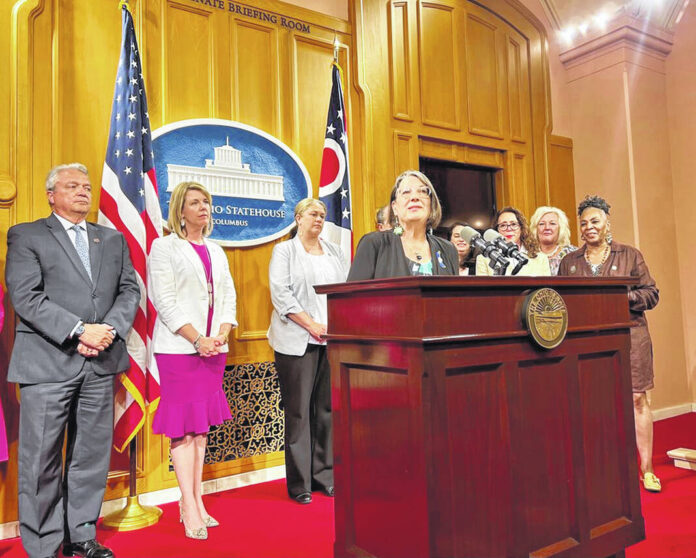COLUMBUS — State Sen. Nickie Antonio will become the first openly gay minority leader in the Ohio Senate when the new two-year legislative session begins Wednesday.
But that’s not the only first that Antonio, a Lakewood Democrat, has racked up in the 220-year-old Ohio General Assembly.
In 2010, she became the first openly gay member elected to the Ohio House of Representatives. She was the first LGBTQ member to hold a leadership position when she was elected House minority whip. In 2018, she became the first woman to hold the Senate District 23 seat, and she was first member of the LGBTQ community elected to the Ohio Senate.
In a legislature with a Republican supermajority that’s not open to gay rights – an LGBTQ nondiscrimination bill has been introduced 10 times and hasn’t become law – Antonio has learned to take the high road.
“One of the things I’ve worked really hard on doing since I’ve been in the legislature is to try to work on separating the policy issues from the personal,” she said. “And as a result, I’ve managed to create and maintain really good relationships with my colleagues. Some disagree with me on some of these issues.”
At the same time, Antonio hopes this relationship-building effort will chip away at misconceptions her colleagues may have about the LGBTQ community, she said.
“It is sometimes frustrating,” she said. “And there are times when it truly makes me sad, sad to think that we as a legislature, as a political and policymaking body, would actually pass legislation that really minimizes and puts barriers in front of people to be their authentic selves and live their best lives.”
However, Antonio’s presence may actually have proven vital to defeating measures that would make life more difficult for LGBTQ Ohioans.
In the last hours of the 2021-2022 legislative session, a bill that would have prohibited transgender girls from playing girls high school sports failed. A bill that combined Florida’s so-called “don’t say gay” legislation with a prohibition on teaching critical race theory also went nowhere in the session. Other anti-LGBTQ legislation in the last decade has also failed.
“I’m not the sole reason for that, but I’m part of the reason why we’ve been able to push back,” she said. “We’ve been able to talk about these things and really try to prioritize what moves us forward, instead of what takes us backward.”
A graduate of Lutheran West High School, Antonio was the first member of her family to graduate from college. She worked as a teacher, an adjunct professor and executive director of an outpatient drug and alcohol treatment program for women. She previously served on Lakewood City Council. She is married to Jean Kosmac and has two adult daughters.
When she was a child, Antonio wanted to work in the classroom.
She earned her undergraduate degree in education at Cleveland State University and began a career working with children with special needs.
But new opportunities presented themselves. She received a master’s in public administration from CSU and completed the Harvard Kennedy School’s Senior Executives in State and Local Government program.
“I thought I was going to be a teacher my whole life,” she said. “And so the doors that opened, the opportunities that presented themselves, all along the way I questioned whether or not this is really something I wanted to take on – knowing that there were times when it was going to be really daunting. But the people sent me here, and it was a diverse group of people that sent me here. I’m determined to get work done for them.”
In many ways, Antonio continues to teach.
She educates lawmakers about the realities of LGBTQ Ohioans and what is at stake since many of them leave the state when they become adults because of the lack nondiscrimination protections and a feeling that they don’t live in a place that supports them.
She tells lawmakers that nondiscrimination is not just about gay people, but about a state’s reputation, its ability to attract younger workers who support LGBTQ rights and bristle at living someplace with laws behind other states. She reminds lawmakers that most Fortune 500 companies already support gay and transgender workers’ rights, and Ohio should send a message that it does, too.
Antonio also teaches her constituents about the legislative process. Laws that pass in Columbus have more of an impact on Ohioans’ everyday lives than those passed by Congress. Yet people tend to pay more attention to politics in Washington.
“I’m like a walking civics lesson all the time,” she said. “Where do I live? Where do I work? Am I always going to Washington? No, I work in Columbus, and in my district is in Lakewood and Cleveland.”
Next legislative session, there will be just seven Democrats in the 33-member state Senate. It’s controlled by Senate President Matt Huffman, a Republican from Lima who is an economic and social conservative.
Antonio and Huffman, in separate interviews, spoke highly of each other, despite stark political differences.
“Are we going to disagree on issues? Absolutely,” Antonio said. “But we’ve already had the opportunity to have tough decisions where we disagree, and we have been able to continue to have a relationship. That’s what we have to do.”
“She’s approachable,” Huffman said. “She’s got a great sense of humor, a great sense of humility about herself. She’s really smart. She’s able to dialogue on a lot of different issues.”
And they share an interest in karaoke. They used to sing when they both served in the Ohio House.
“I’m predicting, at some point in the two-year General Assembly, that there will be a duet in public between Senator Antonio and myself,” Huffman said. “We haven’t made any music selections yet.”
“I think it’s going to have to wait until we get through the budget,” Antonio said. “And maybe we’ll have to sing something together.”







